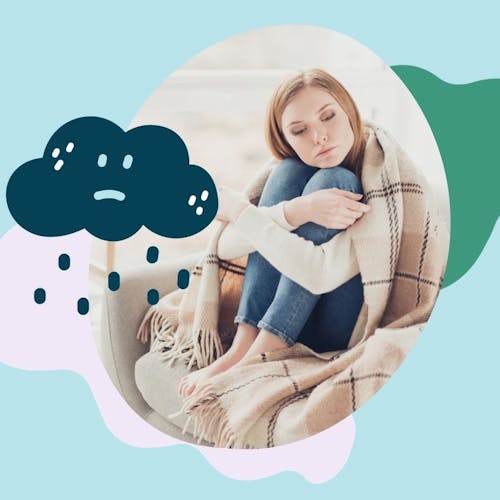This website uses cookies to enhance the user experience. By using Yoppie you are agreeing to our use of cookies.
What Are The Main Symptoms Of PMDD?
Written by Yoppie
01 Apr 2022
PMDD? I thought it was PMS…
So PMDD symptoms are different from PMS?
What causes PMDD?
Why isn’t PMDD talked about more?
Will I struggle to get a PMDD diagnosis?
What can I do to help myself if I have PMDD?
My partner has PMDD, how do I help them?
PMS is pretty well known by now, but the acronym PMDD is a little more mysterious. It stands for premenstrual dysphoric disorder, and we’re taking a look at exactly what this condition is, the symptoms, how it differs from PMS, and why it’s so hard to get a diagnosis. Oh, and of course some tips on how to handle it if you do. Here we go…
PMDD? I thought it was PMS…
Premenstrual dysphoric disorder (PMDD) is a more intense and serious form of PMS (premenstrual syndrome), and for a long time it wasn’t considered a ‘real thing’. With PMS, symptoms include things like bloating, breast tenderness and irritability before your period.
However, those who suffer from PMDD will experience more intense emotional symptoms like extreme irritability, anxiety and/or depression. Like with PMS, they tend to ease after your period arrives, but they can definitely interfere with your daily life in the meantime.
It’s believed around 20-40% of people with periods experience “moderate to severe” PMS symptoms, with 3-8% of these cases experiencing symptoms that stop them participating normally in daily life. This could be PMDD.
So PMDD symptoms are different from PMS?
In most cases the mental and emotional symptoms are worse for those with PMDD. On top of the regular physical PMS symptoms, PMDD can also cause emotions like anxiety, intense anger or irritability, difficulty focusing, fatigue, food cravings, binge eating, and mood swings. On the more extreme end of the scale, it can cause panic attacks, insomnia, depression and even suicidal thoughts.
What causes PMDD?
Unfortunately the cause of PMDD has not yet been found, but it is thought to be due to an abnormal reaction to normal hormone changes occuring each month during the cycle. These hormone changes can cause a deficiency in serotonin, a chemical in the brain and gut that narrows blood vessels and influences mood.
Why isn’t PMDD talked about more?
PMDD has always been misunderstood, and since the term was first coined there have been questions over whether or not it should be classed as a mental disorder. It’s estimated that around 15% of people who suffer from PMDD have at some point attempted suicide, and this research has led to the condition being taken much more seriously.
If you have suicidal thoughts, you can reach out to Samaritans at any time for confidential help by calling 116 123.
In 2013, PMDD was included as a full category in the DSM-5 - the latest edition of the American Psychiatric Association's Diagnostic and Statistical Manual of Mental Disorders. This text essentially tells us which disorders are recognised by doctors and scientists, so this is a positive step in the right direction.
Will I struggle to get a PMDD diagnosis?
The best place to start for a diagnosis is to visit your GP and discuss your symptoms. To help them understand, it’s a good idea to keep a detailed log of symptoms for a few months (although if your symptoms are intense or you have suicidal thoughts, do not wait to see your GP about this). Keeping a log will help identify patterns, and your doctor may also ask about your medical history, lifestyle, or do a physical examination.
Diagnosis can be a slow process, so try not to feel disheartened while tracking your symptoms. You may need to visit your doctor several times to rule out other conditions, but stay open to feedback on what else may be going on, and if you don’t feel they are helping you, remember you can switch doctors or ask to be referred to a specialist.
What can I do to help myself if I have PMDD?
If you want to take your health into your own hands and see if you can improve your symptoms solo, there are other lifestyle changes and things you can try, such as:
- Exercise regularly - one PMS study found regular exercise lessened pain and improved mood
- Try yoga - a 2016 study found 12 weeks of yoga could improve menstrual pain, decrease cramps, and enhance energy levels and mental health
- Get more sleep - getting good quality sleep can do wonders for energy levels, mood balance and fatigue issues
- Improve your diet - remove as much junk/processed food from your diet as you can, and stick to whole foods to help your overall health and reduce symptoms
- Try supplements - supplements for specific symptoms can help ease them. Yoppie’s PMS supplement range is formulated by experts to treat all kinds of PMS symptoms
- Consider counselling - CBT or group therapy for those with PMDD can help you feel validated and provide a space to talk about symptoms and treatments with others
My partner has PMDD, how do I help them?
If someone you love has PMDD, understanding more about the condition is always helpful. Avoid treating it like ‘just PMS’ as their experience may be different to others, and feeling dismissed will make it harder for them to open up.
Try asking what things become difficult for them to manage as a result of PMDD, and discuss what helps them cope and how best to support them. It can help to plan things around their monthly cycle, but if they are going through this right now, reassure them that the feeling will pass and gently encourage them to see their GP.
If someone with PMDD is discussing suicidal thoughts with you, Samaritans offers practical advice on how to support them - click here. Remember it’s challenging to support someone who is suffering, so don’t forget to look after yourself and set boundaries where necessary.
Got a question about PMDD we haven’t covered here? Let us know! You can reach out in our Full Stop FB group, or get in touch with us directly on Instagram at @itsyoppie. Don't forget that our personalised menstrual cycle subscription box can get organic tampons, PMS supplements and much more delivered easily and regularly through your letterbox, to give you just a bit more peace of mind each cycle.
Section jump
Back to top
Subscribe To Our Newsletter
YOPPIE





© 2026 Yoppie is a registered trademark of Phlo Technologies Ltd.
Yoppie's supplements are not a substitute for a varied diet and healthy lifestyle and are not intended to diagnose, treat, or cure any disease. If you are pregnant, breastfeeding, have a medical condition or are under medical supervision, please consult with your doctor before taking any of our products.






